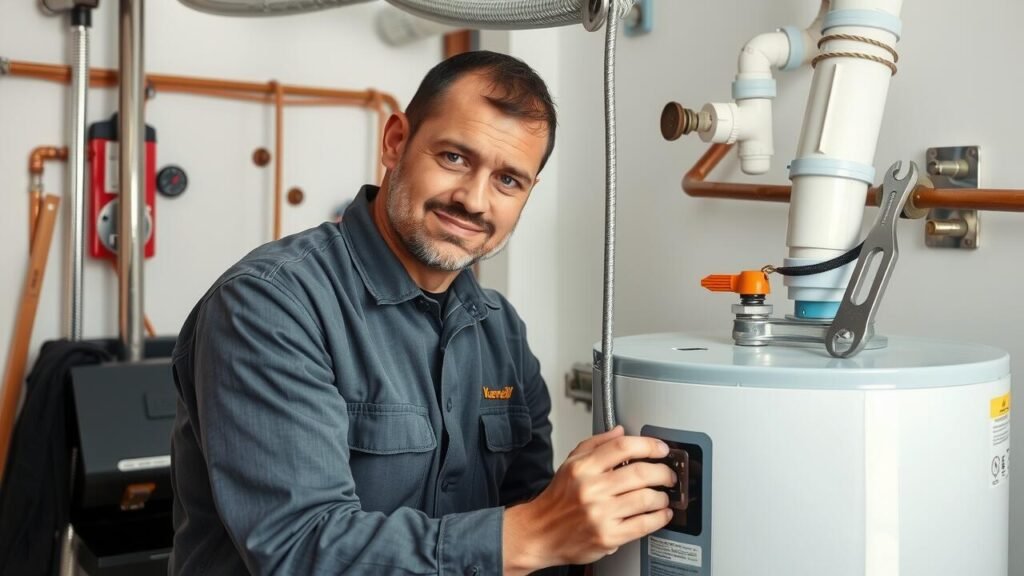Importance of Proper Installation
Proper installation of a water heater plays a crucial role in determining its overall lifespan and efficiency. A unit that is not installed according to manufacturer specifications may experience improper heating, inefficient energy use, and increased wear and tear. Ensuring that pipes, fittings, and venting systems are correctly set up can prevent a host of problems, from leaks to system malfunctions. Homeowners should prioritize professional installation to guarantee that their water heater operates smoothly and effectively.
Choosing between professional installation and a DIY approach can significantly impact the longevity of the appliance. While it might be tempting to handle the installation without expert help, the risks associated with improper setup can lead to costly repairs or early replacement. Searching for “Water Heater Repair and Installation near me” can connect homeowners to qualified professionals who understand the intricacies involved and can ensure that the unit is installed correctly. This choice can yield long-term benefits, minimizing the likelihood of breakdowns and extending the life of the water heater.
Professional vs. DIY Installation
When installing a water heater, the choice between professional services and DIY approaches can significantly affect its longevity. Professionals possess the necessary training and experience, ensuring the installation aligns with local codes and manufacturer specifications. This expertise minimizes the risk of improper connections, leaks, or system failures that could compromise the unit’s lifespan. Considering these factors, seeking “Water Heater Repair and Installation near me” can lead to better long-term performance and peace of mind.
On the other hand, DIY installations may seem tempting for those looking to save money. However, without specialized knowledge, individuals might overlook crucial aspects such as the correct sizing of pipes and connections. Mistakes can lead to inefficiencies or damage that would not only shorten the water heater’s life but could also result in costly repairs down the line. Investing in a professional installation often proves to be a more reliable and sustainable choice.
Impact of Water Quality on Longevity
Water quality plays a significant role in the lifespan of a water heater. The composition of the water, including the presence of minerals and contaminants, can have detrimental effects on the unit’s components. Hard water, which contains high levels of calcium and magnesium, can lead to mineral buildup within the tank and pipes. This buildup not only reduces the efficiency of the heater but can also cause premature failure, necessitating costly repairs or replacements.
Additionally, poor water quality can lead to corrosion and rust formation, especially in older units. Regular maintenance is key to addressing these issues and ensuring the longevity of your water heater. Homeowners should consider seeking out “Water Heater Repair and Installation near me” to find local professionals who can assess and address water quality concerns effectively, thus prolonging the life of the heater.
Hard Water and Mineral Buildup
Hard water contains a high concentration of minerals such as calcium and magnesium. Over time, these minerals can accumulate inside a water heater, leading to significant issues including reduced efficiency and increased energy consumption. The buildup of scale can hinder water flow, making the heater work harder to provide adequate hot water. Regular maintenance is essential to prevent this type of buildup, as failing to address it may ultimately shorten the lifespan of the appliance.
Homeowners experiencing issues related to hard water should consider seeking professional help. Services like “Water Heater Repair and Installation near me” can provide assessments of the system and recommend solutions to mitigate mineral buildup. Flushing the tank periodically and installing a water softener can also be effective measures. Taking proactive steps can enhance performance and prolong the life of the water heater.
Energy Efficiency and Its Relation to Lifespan
Energy efficiency plays a significant role in the lifespan of a water heater. An energy-efficient model not only reduces monthly utility bills but also minimizes wear and tear on the system. These units often come equipped with advanced technologies that regulate temperature and maintain optimum performance. When owners choose energy-efficient water heaters, they’re making a long-term investment that can lead to fewer repairs and extended operational life.
Regular maintenance also impacts energy efficiency and longevity. Homeowners are encouraged to seek professional help for tasks that ensure the proper functioning of their water heaters. When searching for assistance, phrases like “Water Heater Repair and Installation near me” can direct them to qualified technicians. This option can provide peace of mind, knowing that the installation and repair work will adhere to industry standards, further contributing to the unit’s durability and efficiency.
Understanding Energy Star Ratings
Energy Star ratings serve as a helpful guide for consumers looking for more efficient water heaters. This rating indicates how well a water heater uses energy compared to similar products. A higher Energy Star rating typically represents lower energy costs over time, making these units a more attractive option for homeowners focused on reducing utilities and enhancing overall efficiency.
When considering a new water heater, look for models that not only provide high Energy Star ratings but also fit your household’s hot water needs. Inadequate capacity can lead to increased strain on the unit, shortening its lifespan. For those uncertain about which model to choose or how to ensure proper installation, searching for “Water Heater Repair and Installation near me” can connect homeowners with professionals who offer expertise in optimizing both performance and lifespan.
FAQS
What is the average life expectancy of a water heater?
The average life expectancy of a water heater is typically between 8 to 12 years, depending on the type and maintenance.
How can proper installation affect the lifespan of a water heater?
Proper installation is crucial as it ensures the unit operates efficiently, reducing the risk of damage and prolonging its lifespan.
What are the differences between professional and DIY installation for water heaters?
Professional installation guarantees compliance with local codes and standards, often resulting in better performance and safety, while DIY installation may save money but poses risks if not done correctly.
How does water quality influence the longevity of a water heater?
Poor water quality, especially hard water containing high levels of minerals, can lead to sediment buildup and corrosion, significantly shortening the lifespan of a water heater.
What steps can I take to prevent mineral buildup in my water heater?
Regularly flushing the tank, using a water softener, and checking the anode rod can help prevent mineral buildup and extend the life of your water heater.

